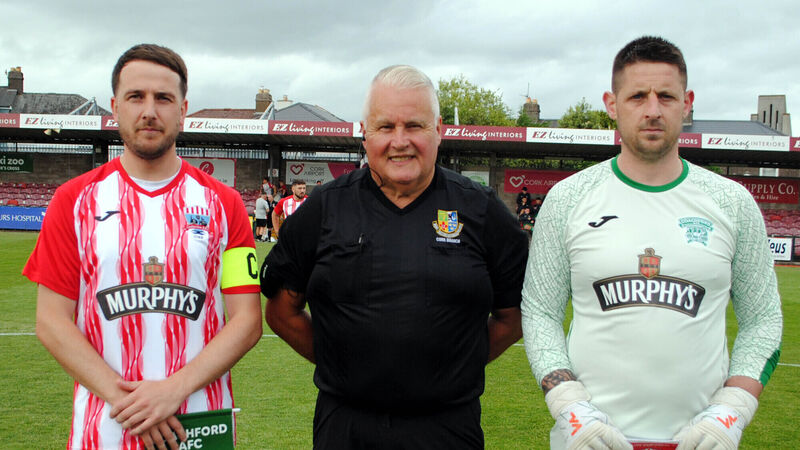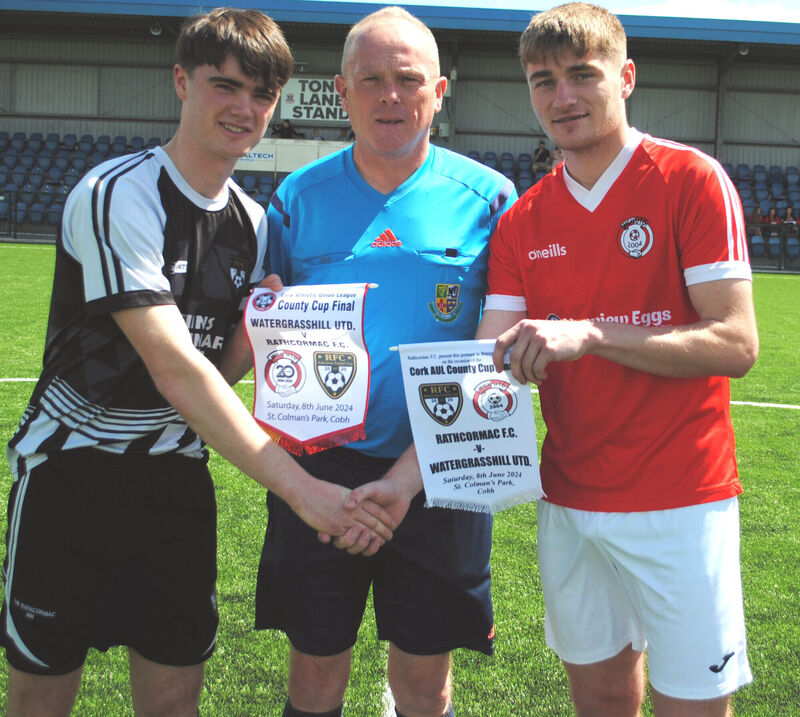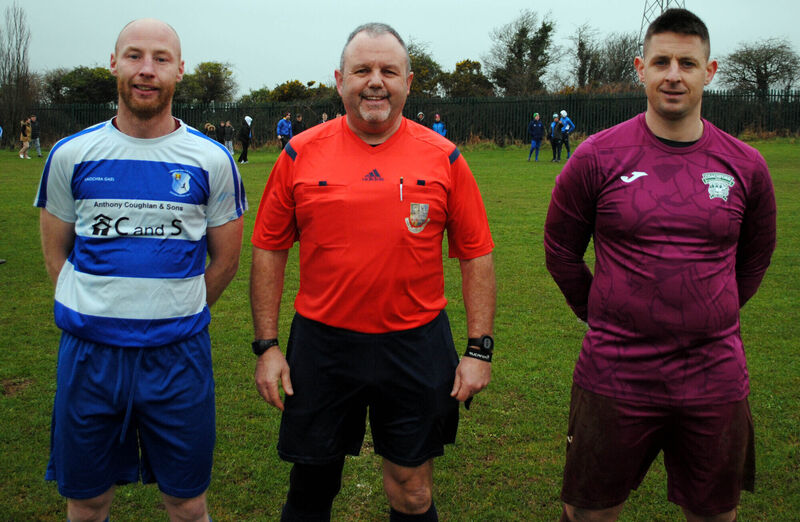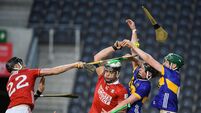All clubs need to be aware of the new rule changes ahead of the new season in August

Coachford FC's captain Stephen Murray (right) with Castleview's Daniel O'Donoghue, accompanied by referee Jim Hennessy.
In order to combat time-wasting by goalkeepers the Law now reads as follows.
A corner kick is awarded if a goalkeeper, inside their penalty area, controls the ball with their hand(s)/arm(s) for more than eight seconds before releasing it.
A goalkeeper is considered to be in control of the ball with their hand(s)/arm(s) when:

• the ball is between their hands/arms or between their hand(s)/arm(s) and any surface (e.g. ground, own body)
• holding the ball in their outstretched open hand(s)
• bouncing it on the ground or throwing it in the air.
The referee will decide when the goalkeeper has control of the ball and the eight seconds begin and will visually count down the last five seconds with a raised hand.
If a goalkeeper has control of the ball with their hand(s)/arm(s) for more than eight seconds, the referee will now award a corner kick (rather than an indirect free kick) on the side of the field closest to the goalkeeper’s position when penalised.
There is no disciplinary action unless the goalkeeper repeatedly commits the offence.
To assist the goalkeeper, the referee will signal the final five seconds using a raised hand.
With regard to game participants off the field of play, the Law now reads like this,
If, without intending to interfere with play unfairly, a team official, substitute, substituted or sent-off player or player who is temporarily off the field of play (injury, adjusting equipment etc.) touches the ball while it is still in play but when it is clearly leaving the field of play, this is penalised with an indirect free kick; there is no sanction.
There are times when a coach, substitute or player who is temporarily off the field of play (among others) touches the ball as it is going out of play with the intention of helping the game restart quickly.
In such cases, an indirect free kick will be awarded but there will be no disciplinary sanction, unless such a sanction is to be issued for persistently leaving the technical area.
The Law now reads like this.
If, when play was stopped:
• the ball was inside the penalty area, the referee drops it for the defending team goalkeeper in their penalty area
• the ball was outside the penalty area, the referee drops it for one player of the team that has or would have gained possession if this can be determined by the referee; otherwise, it is dropped for one player of the team that last touched it.
The ball is dropped at its position when play was stopped.

There are times when the ball would clearly have gone to an opponent of the team that last touched the ball.
In such instances, it is fairer for the ball to be dropped for the team that would have gained possession, as long as this is clear to the referee.
Outside the penalty area, the ball will now be dropped at its position when play was stopped.
Following the introduction of the eight second restriction on goalkeepers controlling the ball the referee can now signal the last five seconds of the eight-second period with their hand(s)/arm(s).
This signal is designed to provide a clear visual reference that the goalkeeper must release the ball within the allowed time.
It's important to continue to use your voice to be proactive and ensure the keeper releases the ball.
Law 3 – The Players
The FAI is committed to reinforcing the ‘Only the Captain’ policy at all levels of the game.

This now included in the IFAB Laws of the Game.
Normal interactions between players and the referee are allowed and remain important
• Players showing dissent by word or action will be cautioned
• Key decisions will be explained to the captain
• Penalty area decisions/ Red cards/ Serious Foul Play/ Goal Decisions
• The captain must approach the referee and engage in a respectful manner
• It may be helpful to delay the restart to allow the captain explain the decision to the players in the vicinity Consistency is key in making this policy a success.
All referees must apply the policy consistently and firmly.
In summary, there have been changes to Laws 12, 9, 8, 5 and 3.
The change to Law 12 (8 second rule) is significant and it's important that this is communicated to goalkeepers in the early stages of its implementation.
Change always brings challenges, use the Only the Captain policy where appropriate and with positive effect to assist you with these new law changes.
So, now you can't say you didn't know. Good luck to all the teams for the new season.








 App?
App?







